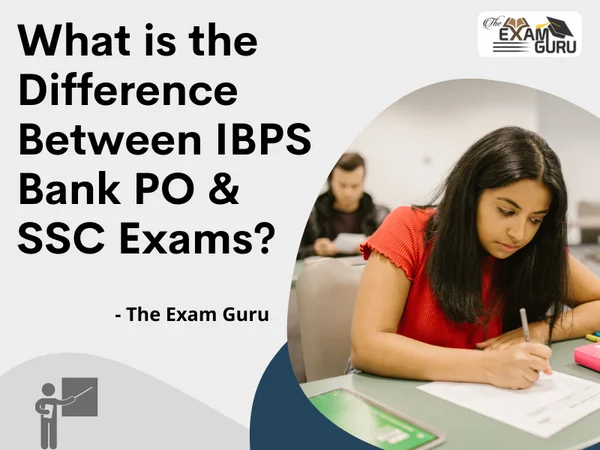What is the Difference Between IBPS Bank PO & SSC Exams?

Are you considering a career in the banking or government sectors? Two popular examinations that can open doors to lucrative job opportunities are the IBPS Bank PO (Institute of Banking Personnel Selection Bank Probationary Officer) and SSC (Staff Selection Commission) exams. While both exams aim to recruit candidates for government jobs, they have distinct features and requirements. In this blog post, we will delve into the differences between IBPS Bank PO and SSC exams to help you make an informed decision about your career path.
- Exam Conducting Body: The IBPS Bank PO exam is conducted by the Institute of Banking Personnel Selection, an autonomous agency that works closely with various public sector banks in India. On the other hand, the SSC exam is conducted by the Staff Selection Commission, which is responsible for recruiting candidates for non-technical government positions across different ministries and departments.
- Job Role: IBPS Bank PO primarily focuses on recruiting probationary officers for public sector banks. As a Bank PO, you would handle various banking operations, such as customer relations, loan processing, account management, and administrative tasks. On the contrary, the SSC exam opens doors to a broader range of government jobs, including positions in ministries, departments, and organizations like income tax, central excise, customs, and more.
- Exam Structure and Syllabus: The exam structure and syllabus for IBPS Bank PO and SSC exams differ significantly. The IBPS Bank PO exam comprises three stages: a preliminary examination, a main examination, and a personal interview. The preliminary examination tests candidates' proficiency in the English language, quantitative aptitude, and reasoning ability. The main examination assesses their knowledge in reasoning and computer aptitude, general awareness, English language, and data analysis and interpretation. The SSC exam, on the other hand, consists of two stages: Tier-I and Tier-II. Tier-I is a computer-based examination that tests candidates' English language, general intelligence and reasoning, quantitative aptitude, and general awareness. Tier II includes a descriptive paper, which evaluates candidates' writing skills, and a computer proficiency test, where necessary.
- Difficulty Level: Both exams have their own level of difficulty. The IBPS Bank PO exam is known for its challenging quantitative aptitude and reasoning sections, which require strong problem-solving skills and analytical thinking. The SSC exam, while also demanding, places emphasis on general intelligence, reasoning, and English language proficiency.
- Job Security and Growth Opportunities: Candidates who qualify for IBPS Bank PO exams are appointed as probationary officers in public sector banks, ensuring a certain level of job security. Additionally, there are opportunities for career growth and promotion within the banking sector based on performance and experience. In the SSC exams, candidates have the chance to secure government jobs in various ministries and departments, providing stability and job security. Promotions and career advancement opportunities are available based on seniority and performance.
In summary, the IBPS Bank PO and SSC exams cater to different career paths within the banking and government sectors. The IBPS Bank PO exam focuses on recruiting probationary officers for public sector banks, while the SSC exam opens doors to a broader range of government positions. Understanding the distinctions in the conducting bodies, job roles, exam structure and syllabus, difficulty levels, and growth opportunities will help you make an informed decision about which exam aligns better with your career aspirations. Assess your strengths, interests, and long-term goals to determine the most suitable path for you. Best of luck with your exam preparation and future endeavors!
Recent Posts
Which Maths Book is Best for a Bank PO?Do Class 12 Marks Matter in the Bank PO?
What is the Minimum Time Required to Prepare for Bank PO Exams?
What are Good Online Sites to Practice Bank PO Exams?
Is 60 Percent Necessary in Graduation to Become a Bank PO?
How Can I Study to Become a Bank PO?
What is the Daily Work Life of a Bank PO?
What is the Best Way to Prepare for Bank PO while Working as an IT Employee?
How do I Prepare for Bank PO and SSC CGL Simultaneously?
How Can I Crack Bank PO Exam in First Attempt?